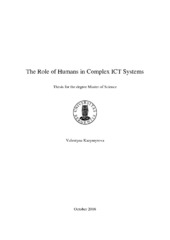| dc.description.abstract | In the modern world, companies, regardless of their type of business, rely on information and communications technology (ICT) systems to carry out their everyday operations. The ICT systems have been developed over time to fit companies' changing needs. It is often hard to determine when and how these systems were modified because of constantly changing environments and stakeholders that come and go. A large industry such as the petroleum business is completely dependent on ICT systems and, as a result, it faces the typical problems related to such systems. This thesis models the interactions between applications used by employees of a real engineering company. Analysis of the model unveiled several classical problems of complex systems, such as centricity, hidden relations, and closedness. The analysis shows that insufficient understanding of the interdependencies between the applications lead to unjustified actions that caused unpredictable consequences. It is argued that the interactions between humans and information technology can never be excluded from the analysis of complex ICT systems without damaging the quality and usefulness of the results. Many real-life examples presented in this thesis show that humans can be the source of errors, but they can also be a critically important to rectify problems before the consequences become intolerable. The role of humans in ICT systems is analyzed from a bottom-up prospective with examples based on the author's experience. The conclusions are supported by case studies from everyday routines. The thesis considers both theoretical and practical aspects of the design, maintenance, and analysis of complex adaptive ICT systems. Since it analyzes a real system, the thesis proposes several practical improvements like openness, advanced human error validation, and team diversity. While the thesis only studies the ICT system of a single company, the recommendations should be of interest to other companies as well. | en_US |
